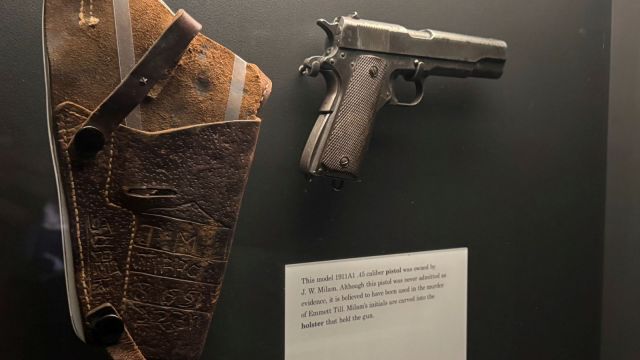Stay updated with the latest - Click here to follow us on Instagram
Gun used in Emmett Till’s lynching is displayed in a museum 70 years after his murder
The weapon once belonged to John William “J.W.” Milam, who, along with Roy Bryant, abducted Till from his great-uncle’s home in Money, Mississippi, on 28 August 1955.
 The gun used in the murder of Emmett Till is on display at the Mississippi Civil Rights Museum on Thursday, Aug. 28, 2025 in Jackson, Miss.. (AP)
The gun used in the murder of Emmett Till is on display at the Mississippi Civil Rights Museum on Thursday, Aug. 28, 2025 in Jackson, Miss.. (AP)The pistol connected to the killing of 14-year-old Emmett Till is now on public display in Mississippi, seven decades after his death, according to the Associated Press (AP).
The Mississippi Department of Archives and History (MDAH) presented the .45-calibre pistol and holster at a press conference on Thursday, marking the 70th anniversary of Till’s murder.
The weapon once belonged to John William “J.W.” Milam, who, along with Roy Bryant, abducted Till from his great-uncle’s home in Money, Mississippi, on 28 August 1955. Till, a Black teenager, had been accused of whistling at a white woman in a local grocery store. He was later beaten and shot, and his body was found in the Tallahatchie River.
Milam and Bryant were charged with murder but acquitted by an all-white jury.
Deborah Watts, Till’s cousin and co-founder of the Emmett Till Legacy Foundation, said she had conflicting views about the gun being shown.
 Mamie Till-Mobley weeps at her son’s funeral on Sept. 6, 1955, in Chicago. (AP Photo)
Mamie Till-Mobley weeps at her son’s funeral on Sept. 6, 1955, in Chicago. (AP Photo)
“It is an emotional day for us, and I just don’t think that associating a murder weapon with the 70th anniversary is appropriate at this time,” Watts told AP.
She said she wanted her cousin’s story preserved but viewed the pistol as “evidence in a struggle for justice that is still ongoing.”
Another cousin, Wheeler Parker, who was present the night Till was kidnapped, welcomed the display.
“I think it’s good because it brings closure,” Parker said in the MDAH statement. “I hope you guys can find the ring and cotton gin. Thank you for doing this.”
The pistol had been held by a family in the Mississippi Delta who gave it to the state archives on condition of anonymity. It will be part of the permanent Emmett Till exhibit at the Mississippi Civil Rights Museum.
MDAH said the gun was authenticated by matching its serial number to FBI records from the 1955 investigation.
Michael Morris, director of the Mississippi Civil Rights Museum and the Museum of Mississippi History, said the display was intended to encourage reflection.
“To me, that’s the legacy,” Morris told AP. “It’s not just his death. It’s the way that he still finds a way to inspire folks to be the change that they want to see in the world.”
Till’s killing is seen as a turning point in the Civil Rights Movement. His funeral in Chicago drew thousands, and his mother, Mamie Till-Mobley, insisted on an open casket so the public could witness the brutality of her son’s death.



- 01
- 02
- 03
- 04
- 05




























